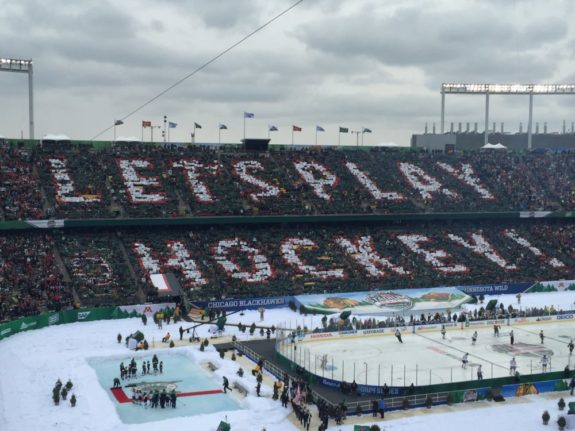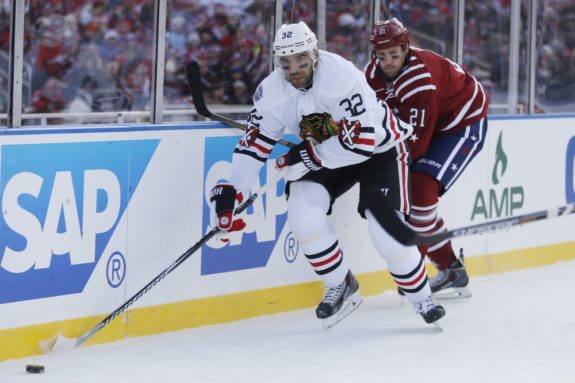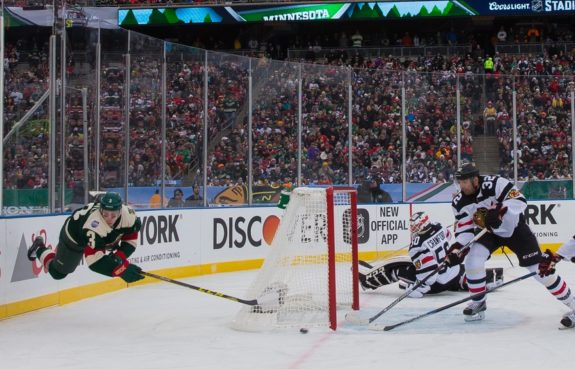Sorry Wild fans, no Winter Classic until 2019, at least.
As anticipated since March, the NHL has awarded the 2018 Winter Classic to New York City. The matchup is set between the New York Rangers and the Buffalo Sabres in which the traveling Sabres will be the home team. Although Yankee Stadium held two Stadium Series games in 2014, this will be the first time the Big Apple will host the Winter Classic.
Why Minnesota Should Host
The list of Winter Classic host cities goes as follows: Buffalo, Chicago, Boston, Pittsburgh, Philadelphia, Ann Arbor/Detroit, Washington, Boston (again), St. Louis, and now New York City.

Although the NHL has proven that it can accommodate outdoor games in warm weather climates (two Stadium Series games in California), the Winter Classic is best suited for traditional hockey markets. My colleague at The Hockey Writers would like to see the Winter Classic come to Dallas and really test out the NHL’s refrigeration technology.
The NHL’s Heritage Classic, which held the first ever regular season outdoor game in 2003, was the catalyst for making the Winter Classic come to life. The Heritage Classic is played exclusively between Canadian teams.
Minnesota is at the top of a very short list of potential new host sites in the United States. Columbus, New Jersey and Colorado are other teams that are in “natural” hockey markets that have not hosted. Nashville and Carolina are alternatives that are a bit further south.
TV Market
Although the Wild may not have the national interest of the Chicago Blackhawks or New York Rangers, their regional viewership ranked in the top five in the United States in 2016-17.

According to the SportsBusiness Journal, the Minnesota Wild finished fourth in national viewership this past season (excluding Nashville, Carolina and the Canadian teams). Fox Sports North saw a 23% increase in viewership for the Wild from the previous season. The Wild finished behind the Sabres, Penguins, Blues, and one spot ahead of the Blackhawks. You may notice something about this list. All of the teams except for the Wild have hosted the Winter Classic.
The State of Hockey
There is a reason so many of the NHL’s top talents come out of Minnesota — hockey is ingrained in the culture of the state. Outdoor NHL games are designed to evoke images of pond hockey. There is a surplus of outdoor hockey rinks and frozen lakes in the Minnesota winters. This gives more people access to participate in hockey from a young age and leads to better competition.
The Minnesota State High School Hockey Tournament may best exemplify the passion the state has for the game of hockey. The Xcel Energy Center, home of the Minnesota Wild, is sold out year-after-year for fans to see Minnesota’s best high school teams compete for the state championship.
Minnesota’s collegiate hockey programs are consistently ranked high nationally. This includes the University of Minnesota, St. Cloud State University, Minnesota State University-Mankato, University of Minnesota Duluth, and Bemidji State University.

In 2015-16, the University of Minnesota’s TCF Bank Stadium held a Stadium Series game between the Minnesota Wild and Chicago Blackhawks. This was Minnesota’s first outdoor NHL game, and it was hugely popular with the fans. The Wild defeated the Blackhawks 6-1.
What’s Next?
It is not difficult to fathom why the NHL hosts Winter Classics in major markets and between popular teams. The NHL is a business, and the Winter Classic is the premier game of the regular season. That being said, Wild fans have the right to be irritated by the NHL’s lack of recognition as a host site.
Although Minnesota is a viable candidate for the 2019 Winter Classic, there is no way to know which direction the NHL will take. It would not be surprising to start seeing more repeat host sites, particularly those in the northeast region of the United States.
It may be in the best interest of the NHL to keep the Winter Classic rotating to new sites, as ratings have been declining over the past few years. Bringing the Winter Classic to the State of Hockey may seem like a risk, but a change of scenery could go a long way.